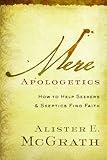 Apologetics is a subject I rarely read books on. It’s partly because it feels like “cheating” to borrow someone else’s reasons to believe instead of thinking for yourself. But I think there is an important place for learning from those who have a particular expertise in defending the faith. This book is subtitled “How to help seekers and skeptics find faith”, and though I wouldn’t describe many of my work colleagues as “seekers”, “skeptics” would be a fair description of many of them. So I thought I would try this relatively short book to see if it provides some good pointers to enable me to share my faith more effectively.
Apologetics is a subject I rarely read books on. It’s partly because it feels like “cheating” to borrow someone else’s reasons to believe instead of thinking for yourself. But I think there is an important place for learning from those who have a particular expertise in defending the faith. This book is subtitled “How to help seekers and skeptics find faith”, and though I wouldn’t describe many of my work colleagues as “seekers”, “skeptics” would be a fair description of many of them. So I thought I would try this relatively short book to see if it provides some good pointers to enable me to share my faith more effectively.
McGrath, a former atheist himself, is well placed to address the topic of apologetics. He has debated a number of prominent atheists as well as writing a number of books responding to their position. He has a scientific background, and wrote a major work some time ago on Scientific Theology (I reviewed a condensed version of it here).
The book title, “Mere Apologetics” is of course evocative of C.S.Lewis’ classic apologetic work “Mere Christianity”. This is quite deliberate since McGrath devotes considerable attention to C.S.Lewis’ uniquely creative and multi-faceted approach to apologetics. I suspect that the writing of this book in some way formed part of his background research for a more recent publication of a biography of Lewis.
McGrath begins with giving some background to apologetics. “Apologetics aims to convert believers into thinkers, and thinkers into believers”. Apologists have the task of defending, commending and “translating” the faith. He stresses the need for a tone of gentleness and respect and the vital importance of God’s sovereign work of salvation.
Apologetics establishes and proclaims the plausibility and desirability of the gospel; evangelism summons people to enter into it and share in its benefits.
Along the way he highlights a number of common apologetic mistakes, including the weaknesses of a purely rationalist approach to defending the faith. In particular he notes the challenges of defending the faith in a post-modern context.
He understands that there are significant dangers in apologetics books that simply try to provide answers to difficult questions that can be memorized and regurgitated at the appropriate time. Instead he stresses the need to understand the question behind the question in order to give an answer that really resonates. An apologist needs to identify arguments that will carry weight with this particular audience, so different occasions call for different approaches.
The heart of apologetics is not about mastering and memorizing a set of techniques designed to manipulate arguments to get the desired conclusion. It is about being mastered by the Christian faith so that its ideas, themes and values are deeply imprinted on our minds and in our hearts.
Unsurprisingly given his background and experience, he does focus more on atheist objections than those raised by other religions or agnostics. There is an interesting but brief discussion concerning the “multiverse”, which is often used by atheists as a way to reduce the force of the cosmic fine tuning argument. This is something I would be interested in reading a little more on, as the multiverse has always seemed a somewhat contrived concept.
Another fascinating topic was responding to Freud’s suggestion that belief in God is simply wish fulfillment – we want him to exist so we imagine he does. McGrath rightly points out that this argument can cut both ways, and is particularly ironic given Freud’s concept of the Oedipus complex.
He stresses that not everyone’s objections are purely intellectual, and so apologists must be ready to show Christianity to be not just rational but exciting, wonderful, beautiful. He does give a few brief examples of how he answered particular questions, showing how he tried to tailor his response to the person asking the question.
One particularly helpful feature of this book is that at the end of each chapter, a number of books for further study are listed. There were lots of very interesting looking options and I may try some of them if time permits.
Overall I would say this books serves as a good introduction to apologetics, explaining what it is and how it should be done. Whilst he does touch on a number of particular issues that apologists deal with, there is not space to cover them in great depth, and in any case he explicitly doesn’t want to produce a book of model answers. McGrath does tend to assume his readers will be defending the faith in public meetings or debates, but there is much to be gained even if you most of your interaction with unbelievers is in informal settings.
On a more general note, I think our culture is becoming increasingly ignorant of what Christians actually believe, and perhaps as a result, increasingly dismissive of our faith. In such a context it would be wise for all Christians to seek to improve their ability to graciously defend and commend the faith. This book would serve as a good starting point for someone who feels inadequately prepared for this task.
